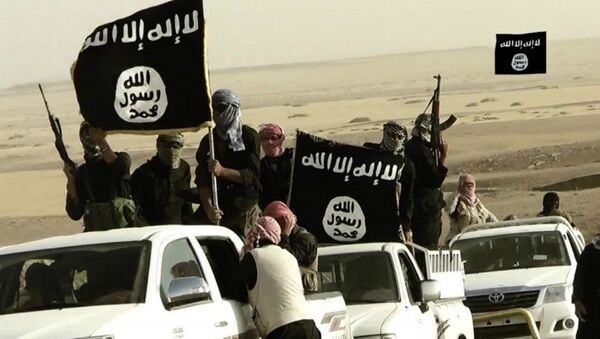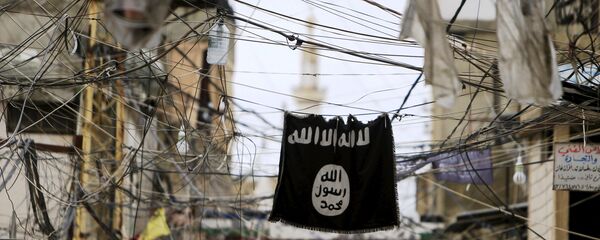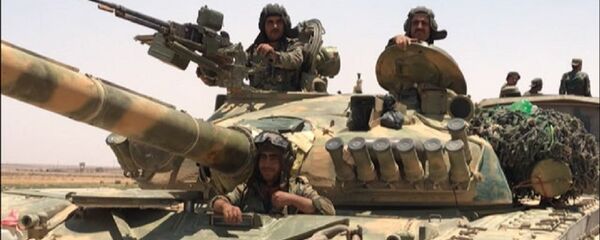Outside the town of al-Baghuz Fawqani, the US-allied Syrian Democratic Forces, composed primarily of Syrian Kurdish militias, have captured hundreds of Daesh militants fleeing from the onslaught. Baghuz is only a couple of miles from the Syrian border with Iraq, across which the roughly 2,000 US forces in Syria will soon withdraw as the war draws to a close.
However, US Army Gen. Joseph Votel, who heads US Central Command, told the House Armed Services Committee Friday, "We will need to maintain a vigilant offensive against this now widely dispersed and disaggregated organization that includes leaders, fighters, facilitators, resources and, of course, their toxic ideology."
These kinds of claims are nothing new: a Pentagon draft report last month warned that without US forces in eastern Syria, Daesh sleeper cells could return the organization to controlling territory in as little as six months, Sputnik reported.
At the time, experts told Sputnik the conclusion was "bulltwaddle" and "Pentagon scare-mongering to keep United States forces in Syria."
"If the US troops leave, there will not be a ‘vacuum,'" former British Ambassador to Syria Peter Ford told Sputnik at the time. "There will not be an ‘ungoverned space.' The Syrian government forces will step in and, either alone or in conjunction with allied forces, including the Russians and possibly a reconstituted SDF, will easily keep on top of ISIS."
"What makes more likely a revival of ISIS are US blocking of Syrian forces from entering the areas in question and the Western policy of creating economic misery through sanctions and attempts to prevent reconstruction," Ford said.
Votel's warning follows the same pattern: "We should be clear that what we are seeing now is not the surrender of ISIS [Daesh] as an organization, but a calculated decision to preserve the safety of their families and preservation of their capabilities by taking their chances in camps for internally displaced persons and going aground in remote areas and waiting for the right time to resurge," he said. "Recent observations by our men and women on the ground highlight that the ISIS population being evacuated from the remaining vestiges of the caliphate largely remain unrepentant, unbroken and radicalized."
A report published Thursday by the hawkish think tank Institute for the Study of War (ISW), however, highlights a different danger, one that's gone somewhat unnoticed in the Western press: Daesh is trying to rebuild its foothold in northern Iraq, too.
The militant group was forced out of the country in 2017, with Baghdad declaring final victory roughly a year ago. However, ISW warns Daesh may have as many as 30,000 fighters in northern Iraq and that it already de facto controls several villages.
"ISIS is re-establishing capable insurgent networks in multiple historic strongholds and linking them together, setting the conditions for future offensive operations against the Government of Iraq," ISW writes. "The US and its partners should not view the current relative security in Baghdad as confirmation of the defeat of ISIS. The US Anti-ISIS Coalition's strategy to enable Iraq to ‘independently manage' an insurgency through intelligence support and other building partner capacity efforts will likely fail to prevent ISIS from regaining momentum based on its current trajectory in Iraq."
However, ISW bases its dire warnings on shaky foundations, assuming that large numbers of Iraqi Kurds are vulnerable to Daesh recruitment.
"Iraqi Kurds have historically contributed to Salafi-Jihadist Groups in Iraq," ISW writes. "Kurdish Salafi-Jihadists operated under the banner of Ansar al-Islam during the Iraq War. Large elements of Ansar al-Islam in Iraq later merged with ISIS in 2014."
However, when it dissolved itself into Daesh in 2014, Ansar al-Islam wasn't more than 350 fighters. That's hardly a basis for ISW to make such an argument.
Indeed, the claim comes across as further justification for the US maintaining its military presence in Iraq, and the conservative Washington Examiner doesn't miss the chance to drive home their point: "In other words, Iraq still needs US support," the paper said on Friday.
That said, some Iraqis are concerned about an uptick in Daesh activity in Iraqi Kurdistan and Anbar Governorate and violence believed to be linked to them, although Baghdad seems to have the situation under control. On Wednesday, Iraqi President Barham Salih cautioned a speech in the northern city of Sulimaniyah, "The danger and the risk of ISIS hasn't been eliminated."
"The victory against ISIS was an important one, and we cannot downplay it," Salih said, according to the UK Independent. "But this was a battlefield and military victory. The caliphate has been eliminated. But there are still sleeper cells and extremist groups along the Syrian border."
On Thursday, six members of Iraq's paramilitary Popular Mobilization Forces were killed and 31 others wounded in an ambush by Daesh in the northern city of Makhmur, Sputnik reported. Makhmur is nestled in the Hamrin Mountains, where Daesh "gangs" have caused Baghdad to increase the government's military presence, including security checkpoints.
Fighting alongside the Iraqi forces are Iraqi Kurds. Kurdish Peshmerga commander General Sirwan Barzani told Al Jazeera in early February that Makhmur formed their front line of operations against Daesh forces hiding in the mountains. ISW estimates Daesh strength in the Hamrin Mountains to be as high as 1,000 fighters, although it cites a 2017 report from Iraqi daily al-Mada, so that information may be out of date.
However, earlier this week, Sputnik reported that Iraqi MP Hassan Salem claimed Daesh was also hiding out in the deserts of Anbar Governorate, a province to the west that directly borders the present warzone in Syria. The Sunday Times reported that Daesh fighters captured outside Baghuz told SDF forces that Daesh leader Abu Bakr al-Baghdadi was hiding out in Anbar, too. In January, the Guardian reported that al-Baghdadi had narrowly survived an assassination attempt by some of his own men in the Syrian city of Hajin, following which he went into a more secluded hiding spot.








